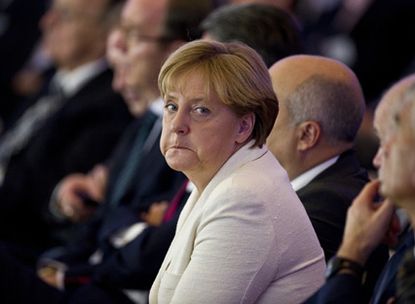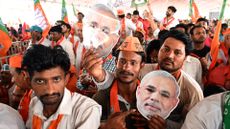Who will replace Angela Merkel as chancellor of Germany?
Her protege is under threat from right-wing candidate in CDU party leadership battle

Germany is gearing up for the final sprint in the race to replace Angela Merkel as leader of the Christian Democratic Union (CDU) party, with the victor set to become the front runner to take over as chancellor in 2021.
Merkel’s protege Annegret Kramp-Karrenbauer had been the favourite to win but is now neck and neck with Friedrich Merz, according to the most recent poll of party delegates. Health Minister Jens Spahn is trailing in third place.
Merkel announced in October that she would not seek re-election as CDU leader at the party’s congress this week, after 18 years at the helm.
Subscribe to The Week
Escape your echo chamber. Get the facts behind the news, plus analysis from multiple perspectives.

Sign up for The Week's Free Newsletters
From our morning news briefing to a weekly Good News Newsletter, get the best of The Week delivered directly to your inbox.
From our morning news briefing to a weekly Good News Newsletter, get the best of The Week delivered directly to your inbox.
She will continue as chancellor until the end of her term, but will step aside at the next federal elections, in three years’ time.
Despite recent electoral setbacks, the CDU remains Germany’s largest political party, and Merkel’s successor as party leader will therefore be in pole position to take the top job and steer the course of the Continent’s largest economy.
So what do we know about the two front runners?
Annegret Kramp-Karrenbauer
Party veteran Kramp-Karrenbauer was widely tipped to win the vote until this week, and could still regain the ground lost to Merz.
Formerly the chief minister of the southwestern state of Saarland, Kramp-Karrenbauer now serves as the CDU’s secretary general.
A political pragmatist who sits firmly alongside Merkel in the moderate middle of the centre-right party, she is seen as the current chancellor’s ideological successor.
Euronews correspondent Jessica Saltz says it's “no secret” within the party that Merkel favours Kramp-Karrenbauer, with whom she foresees an “incredibly harmonious relationship”.
However, Merkel’s backing could prove both a help and a hindrance.
The chancellor’s plunging approval ratings paved the way for her decision to step aside in 2021, and a candidate widely seen as a Merkel “clone” may prove a hard sell to an electorate exhibiting an appetite for change.
Kramp-Karrenbauer appears ambivalent about comparisons with Merkel, telling NBC News that there are both “similarities” and “issues that separate us”.
“I’m showing that genuinely and authentically and won’t create an artificial separation, because it has something to do with character and attitude,” she added.
Friedrich Merz
One of Merkel’s original rivals for leadership of the CDU back in 2000, Friedrich Merz has re-emerged as a thorn in her side after spending a decade in the private sector.
Merz’s long absence from German political life may actually have worked in his favour, giving him the appearance of “distance from the political compromises of the past ten years”, says Time magazine.
A corporate lawyer by trade, Merz sits on the right-wing of the party, describing himself as pro-business and socially conservative.
“His charisma appeals to members who have grown tired of Mrs Merkel’s centrist equivocations,” says The Economist. At a hustings last month, he “jabbed at his old rival by urging the party to stop aping the Social Democrats, its junior coalition partner”.
However, his views on the hot-button topics of immigration and asylum may prove a turn-off for more moderate delegates.
Last month, his suggestion that Germany would have to rethink the “right to asylum” drew criticism from opposite ends of the spectrum, with the far-right Alternative for Germany accusing him of stealing their policies and the centre-left Social Democrats branding him “Trump lite”, Deutsche Welle reports.
Create an account with the same email registered to your subscription to unlock access.
Sign up for Today's Best Articles in your inbox
A free daily email with the biggest news stories of the day – and the best features from TheWeek.com
-
 The week's best photos
The week's best photosIn Pictures Playful goslings, an exploding snowman, and more
By Anahi Valenzuela, The Week US Published
-
 What is rock flour and how can it help to fight climate change?
What is rock flour and how can it help to fight climate change?The Explainer Glacier dust to the rescue
By Devika Rao, The Week US Published
-
 Crossword: April 19, 2024
Crossword: April 19, 2024The Week's daily crossword puzzle
By The Week Staff Published
-
 Sudan on brink of collapse after a year of war
Sudan on brink of collapse after a year of warSpeed Read 18 million people face famine as the country continues its bloody downward spiral
By Peter Weber, The Week US Published
-
 How powerful is Iran?
How powerful is Iran?Today's big question Islamic republic is facing domestic dissent and 'economic peril' but has a vast military, dangerous allies and a nuclear threat
By Harriet Marsden, The Week UK Published
-
 US, Israel brace for Iran retaliatory strikes
US, Israel brace for Iran retaliatory strikesSpeed Read An Iranian attack on Israel is believed to be imminent
By Peter Weber, The Week US Published
-
 How green onions could swing South Korea's election
How green onions could swing South Korea's electionThe Explainer Country's president has fallen foul of the oldest trick in the campaign book, not knowing the price of groceries
By Sorcha Bradley, The Week UK Published
-
 Botswana and Germany are feuding over elephants
Botswana and Germany are feuding over elephantsIn the Spotlight The Botswanan president has threatened to send 20,000 elephants to Germany as the rift continues
By Justin Klawans, The Week US Published
-
 Ukraine's battle to save Kharkiv from Putin's drones
Ukraine's battle to save Kharkiv from Putin's dronesThe Explainer Country's second-largest city has been under almost daily attacks since February amid claims Russia wants to make it uninhabitable
By Sorcha Bradley, The Week UK Published
-
 India elections 2024: the logistics of world's biggest vote
India elections 2024: the logistics of world's biggest voteThe Explainer More than 10% of the world's population is registered for a historic democratic exercise, with PM Modi likely to dominate again
By Harriet Marsden, The Week UK Published
-
 Erdogan set back in key regional elections
Erdogan set back in key regional electionsSpeed Read The main opposition party flipped or held Turkey's biggest cities, including Istanbul
By Peter Weber, The Week US Published